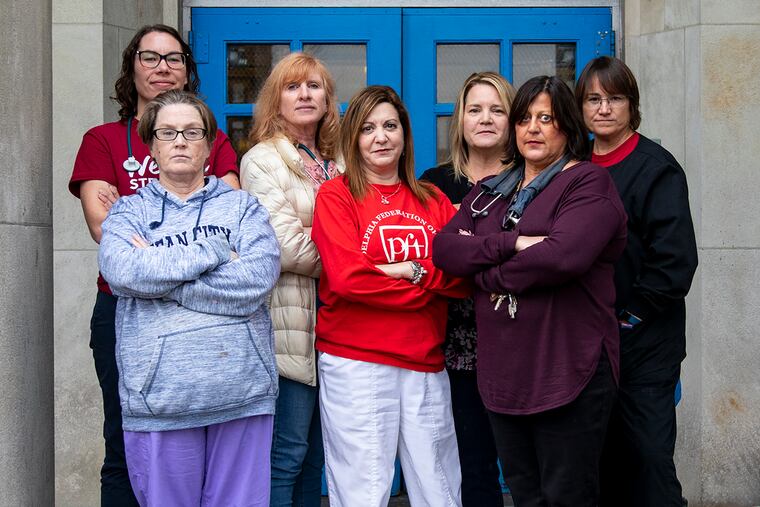Philly schools will lose money because of medical services gap
“Kids are bringing their own medication in, they’re self-medicating, they’re sharing medication,” Johnson said, adding that if one of the students had an adverse reaction to the medication, the district would have had a “catastrophic nightmare” on its hands.

The Philadelphia School District will lose out on revenue because of a gap when it was without a district physician, officials said Thursday night.
Typically, the district bills Medicaid for some services provided by its nurse-practitioners, physical and occupational therapists, speech language pathologists, and other providers. But because it went weeks without a physician, services performed in that period will not be reimbursed.
Medicaid reimbursements typically pay for expensive equipment needed by children with special needs that allows them to sit, stand, and communicate.
Robin Roberts, a district physical therapist, called the problem “a self-inflicted wound.” She estimated that the district would lose out on $2.5 million because of the physician gap.
The district’s chief financial officer, Uri Monson, said that number was way too high.
“There is probably a loss — we’re still trying to figure it out. The early estimate of the most at risk we would be is less than 10% of the amount cited tonight," Monson said after the meeting. That would put the loss at $250,000.
The board moved Thursday night to pay the city Public Health Department up to $100,000 to serve as interim district physician until the end of the year, effective retroactively to Wednesday.
Having a temporary physician means school nurses will be able to administer the over-the-counter medications that are a staple of their offices. They had been unable to do so in the absence of a doctor’s standing orders.
The district’s physician left in early October, but nurses were not formally notified, and so some continued to administer medication without the legally required orders. School nurses raised the issue to their supervisors before the November school board meeting, but nothing changed until the issue became public, board members expressed concern, and nurses eventually received orders to stop administering medications until a physician was hired.
» READ MORE: Read more: School nurses sound the alarm
School nurse Anne Johnson said that during the period she was unable to dispense medications like Tylenol and hydrocortisone, students were suffering.
“Kids are bringing their own medication in, they’re self-medicating, they’re sharing medication,” Johnson said, adding that if one of the students had an adverse reaction to medication, the district would have had a “catastrophic nightmare” on its hands.
On behalf of 166 school nurses, Emily Seiter delivered a petition reinforcing nurses’ concerns over how student health and vaccination compliance are being handled. This year, the district began directing nonmedical personnel to work on ensuring that students obtain state-required immunizations, a job that fell to nurses in the past.
Seiter and others said the district was excluding medical professionals from student health decision-making to its peril.
A nurse with 20 years’ school experience signed the petition, stating that she had a 100% vaccine compliance rate until nonmedical personnel became involved.
“Once again, a problem was manufactured by the intervention of nonmedical personnel, stopping nurses from using their medical judgment and working directly with families,” the veteran nurse wrote.
Another nurse wrote that “this poor policy decision in the midst of outbreaks of vaccine-preventable diseases puts our students at grave risk.”
School Board President Joyce Wilkerson, who was re-elected Thursday night, asked Superintendent William R. Hite Jr. to provide a report on revenue lost because of the physician gap.
About that office renovation
Hite defended his decision to spend more than a half-million dollars on changes to his office space.
As first reported in the Philadelphia Public School Notebook, the district spent $604,000 renovating the superintendent’s suite of offices, a move that angered many school staff, who pointed out that most children are taught and teachers work in old buildings that the district cannot afford to rid of lead paint and asbestos.
(Testifying about the district’s environmental problems, Masterman student Aden Gonzalez said she knows money is an issue, but asked that the issue be treated with more urgency. “I am not sure that the air that I breathe in my school won’t 20 years from now be identified as the cause of my serious illness,” Gonzalez said.)
After the district’s charter school and inspector general offices expanded, its communications and external relations teams moved into the superintendent’s offices, which were configured in a way that made it difficult to accommodate all the employees, Hite said.
“To best support staff productivity, the office was converted from a space housing multiple offices to an open-concept floor plan, which allows for more collaboration,” Hite told the board. “I’m happy to say the new space has increased work-space capacity by 70% and has better accommodated the additional people working inside the office who work in support of our schools and our students.”
The school board had authorized the expenditure at its June meeting.
Six charters get re-upped
The school board also voted to authorize new charters for six existing charter schools. Folk-Arts Cultural Treasures Charter School, Mastery Charter High School, Mastery-Harrity, Mastery-Mann, Mastery-Smedley, and Mastery-Thomas all were approved for five year terms.
Members of the Alliance for Philadelphia Public Schools objected to the renewals under the Sunshine Act, saying the board illegally negotiated the terms of the charters without public input.